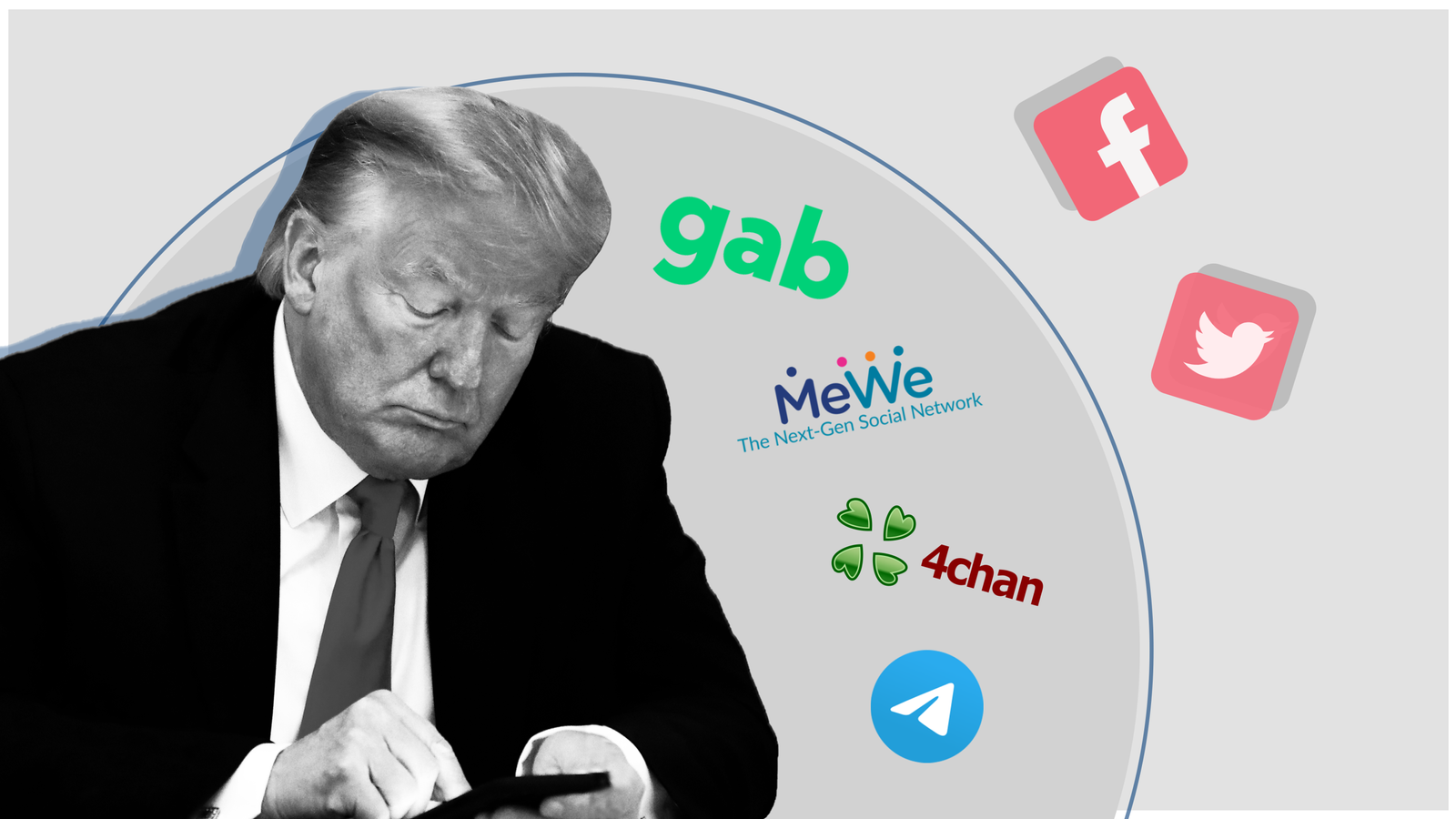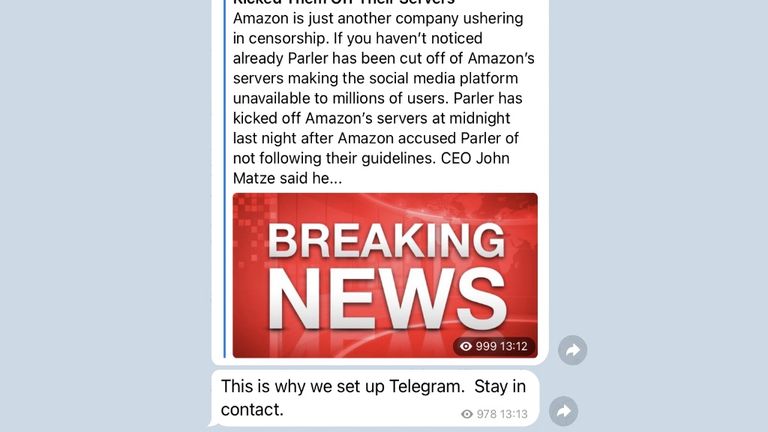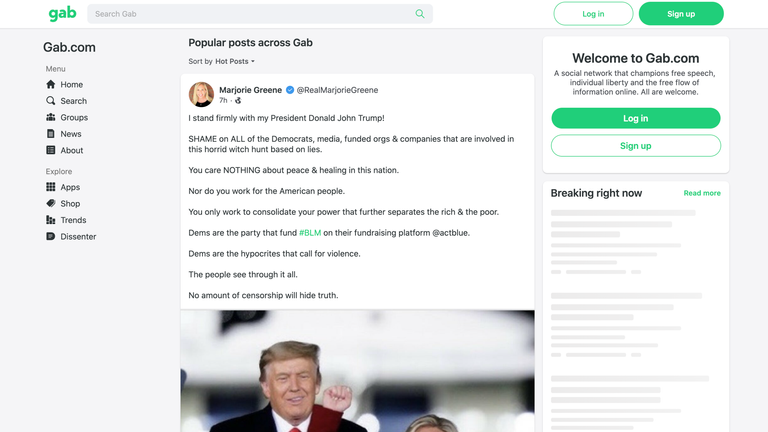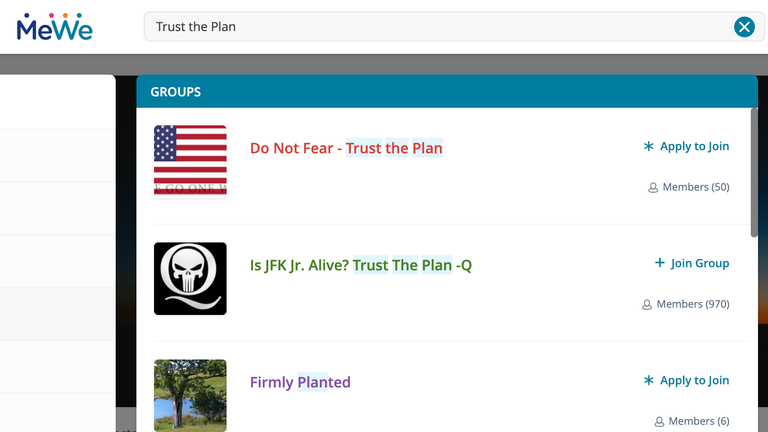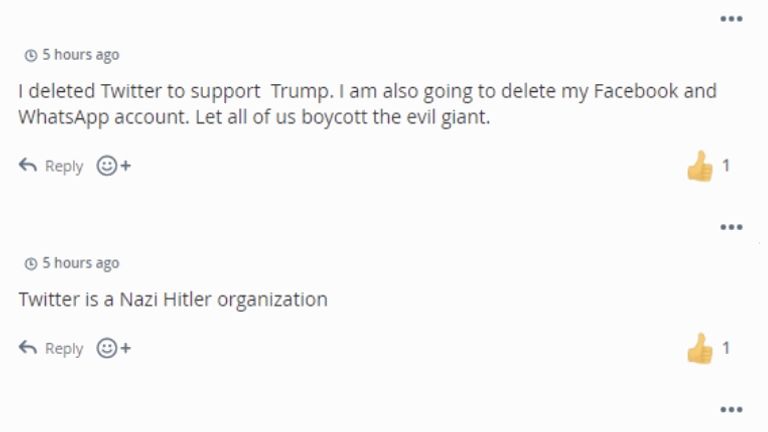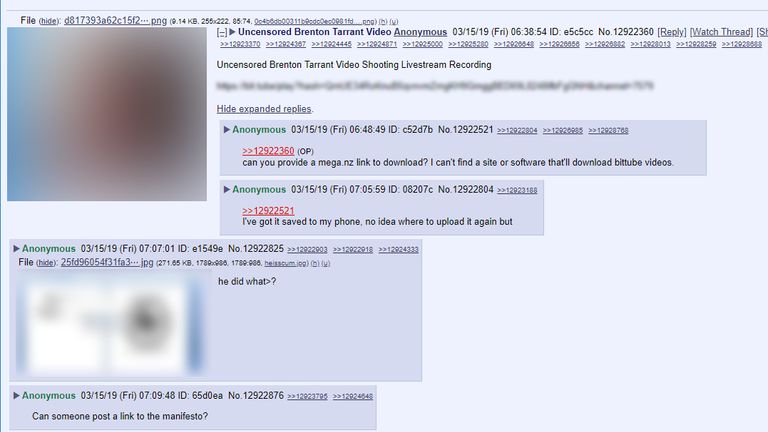The attack on the US Capitol prompted unprecedented action from Twitter and Facebook, amid criticism that the president was using their platforms to foment an insurrection.
Tens of thousands of accounts, pages and groups tied to the more extreme parts of the pro-Trump movement have been suspended and banned following the attack – as have Donald Trump’s own accounts – driving his supporters to fringe websites.
One alternative platform, Parler, was removed from Apple and Google’s app stores over the weekend – with Amazon kicking Parler’s website off its hosting infrastructure. Now, many of Mr Trump’s supporters are seeking services that can resist action taken by tech giants and governments.
Sky News has observed a rise in the number of conversations and engagements taking place on platforms such as Gab, MeWe, Telegram and CloutHub.
The scale of the bans on mainstream social networks is not clear. Twitter says it has removed 70,000 accounts that promoted the QAnon conspiracy theory – but many users operated multiple accounts, so the size of the movement on the platform was smaller than it first appeared.
Facebook announced that it would begin removing posts quoting the QAnon catchphrase “stop the steal” ahead of Joe Biden’s inauguration on 20 January due to the risk of additional violence.
But these messages have found new spaces to flourish, as Sky News found through direct observations and data from CrowdTangle, a public insights tool owned and operated by Facebook.
Social networks like Gab and MeWe are offering a replacement for Facebook and Twitter – while other aspects of the movement continue to foment on even more fringe forums including 4chan, 8chan, and The Donald.
Gab
Gab was launched as a self-proclaimed free speech website in 2016 by Andrew Torba and Ekrem Buyukkaya. It is now widely considered to be a digital haven for far-right extremists, with researchers linking it to radicalisation and offline violence.
Its users include US politician Marjorie Greene, a newly elected Republican member of the House of Representatives, who has regularly supported the QAnon conspiracy theory.
Ms Greene had posted a picture of herself on Facebook holding a rifle next to images of Democratic congresswomen Alexandria Ocasio-Cortez, Ilhan Omar and Rashida Tlaib – stating it was time to “go on the offence against these socialists who want to rip our country apart”. Facebook deleted the image for inciting violence.
In a new post on Gab, Ms Greene said: “Dems are the hypocrites that call for violence. The people see through it all. No amount of censorship will hide the truth.”
Gab’s app was removed from the Google Play store in 2017 for violating hate speech policy, and it is not listed in Apple’s app store for similar reasons.
Despite this, Google Trends data shows an increase in searches for Gab following Mr Trump’s suspension from Twitter on 8 January – notably in traditionally conservative states such as Alaska and North Dakota.
CrowdTangle – which tracks public interactions such as likes, comments and shares on public Facebook posts – also shows an increase in interactions on posts that mention Gab. It recorded over 290,000 interactions on these posts since Sunday.
Following the move to take Parler offline, Gab claimed that it was adding more than 600,000 new users every day in a tweet that was subsequently deleted. Independent metrics gauging the social network’s popularity are not available.
As the site appeared to deal with the apparent influx of new visitors, the company’s chief technology officer said they had brought 10 new servers online and quoted Mr Trump in stating: “The best is yet to come.”
Gab’s owners have regularly used their Twitter accounts to express support for Donald Trump and actively market their platform on the basis of being sympathetic to causes popular with the far-right, including conspiracy theories they claim are being unfairly targeted for censorship.
Alongside these posts, the platform features news articles from Russia Today, as well as pseudo-religious messages from QAnon followers calling for the community to keep the faith, with one stating: “Do you have any idea what’s going to happen next? Good. Neither do they.”
MeWe
MeWe was founded in 2012 by Mark Weinstein, initially as a privacy-positive version of Facebook. The social networking service has grown in popularity with Mr Trump’s supporters as a result of moderation efforts pushing some of them away from more mainstream platforms.
CrowdTangle data shows a rise in interactions with public posts mentioning MeWe following 8 January, with nearly 100,000 interactions recorded on the following day. There was also a marked increase in public interactions on posts of this kind in the weeks that followed the election.
MeWe has jumped almost 100 places in the US app store rankings over the past two days – and according to Sensor Tower, it is now the seventh-most popular free app. It also saw a surge in popularity after November’s vote.
The app’s pro-Trump user base appears to have been increasing over recent months – although it has not been courted by Mr Weinstein.
He has said: “I think sites where anything goes are terrible. At MeWe we have strict rules in our terms prohibiting content inciting violence, posting hate, bullying, breaking the law, etc.”
Telegram
Telegram is one of the most popular apps outside of the English-speaking world, especially among protesting communities.
It offers end-to-end encryption (although not by default), as well as large chat rooms – both public and private – where users can share photos, videos and files with each other.
Pro-Trump Telegram channels have noted the increasing number of influential conservative commentators joining Telegram after Parler was taken offline.
Like Gab and MeWe, CrowdTangle shows an increase in interactions on public posts mentioning the word Telegram on Facebook in the days leading up to and after Trump’s suspension from social media.
Membership appears to be growing especially significantly in extremist Telegram chats, according to Professor Megan Squire. She warned on Twitter that white nationalists are attempting to win over Trump supporters who are joining the platform due to the actions taken by Twitter and Facebook.
The Washington Post reported that talk of guns and potential violence was “rife” on the messaging app ahead of the mob attack on the Capitol following the president’s rally.
Telegram has climbed up the app store rankings in the days since 8 January – where it now occupies the second spot, according to Sensor Tower.
This may be partially driven by privacy concerns regarding WhatsApp rather than by supporters of Donald Trump.
CloutHub
Founded in 2018, CloutHub markets itself as “the people’s platform” for users engaged in political, social and community activism. Like Gab, they have been vocal about their opposition to perceived censorship by Big Tech.
CloutHub has enjoyed a surge in interest in recent days. There were 512 interactions on public Facebook posts mentioning CloutHub on 512 – but according to CrowdTangle, this rose to 32,100 a day later.
This came after the anti-Democrat #WalkAway campaign announced it was moving to CloutHub following its removal by Facebook.
Google Trends data also indicates an increase in interest in the site in the US through its analysis of search queries.
Extremists spread across platforms
According to Fred Burton, a former special agent, the distribution of potential extremists across fringe platforms doesn’t necessarily make things more difficult for law enforcement monitoring potential threats.
The executive director of the Centre for Protective Intelligence at Ontic said: “The US intelligence community is geared for these kinds of investigations.
“The ability to go back and look at some of these individuals that are on these fringe kind of elements, the howlers that are out there, whether it be on fringe social media platforms – even with Parler being shut down now – law enforcement is very good at looking and ferreting out those kinds of individuals.
“Since 9/11, technology has been enhanced to the point that all of your digital signals can be looked at from an investigative perspective if there’s probable cause to believe that a crime has been committed, or if someone’s on there fomenting hate speech.
“Social media is a double-edged sword, we all know that, but it also provides law enforcement with the opportunity to be able to do some continuous monitoring of individuals that might be predisposed towards that kind of violence.”
Mr Burton, who has worked in the arena of protective intelligence since the 1980s, said: “The ones that you can see are the ones that – yes, at times, you have to worry about – but there are others [that you can’t see] always, that you really have to be concerned about.”
Addressing the threat posed by these individuals “takes more human intelligence efforts, and the FBI Joint Terrorism Task Force – again another byproduct of what happened after 9/11 – are very good at ferreting out those kinds of individuals”.
Far-right terrorists have been known to use sites such as 4chan and 8chan, which aren’t replacements for social networks clamping down on some of Mr Trump’s supporters, but remain key locations fomenting many of the ideological messages that drive the movement on other platforms.
Shortly before the mass shootings at two mosques in the New Zealand city of Christchurch, the gunman posted a link on 8chan to the Facebook page where he would livestream his attack, as well as a copy of his manifesto.
8kun/8chan
Following two other domestic terror attacks in the US in August 2019 – one involving a mass shooting at a Walmart in Texas, and another at a bar in Ohio – 8chan lost its hosting provider and renamed itself 8kun.
Its original founder, Fredrick Brennan, now disavows the site entirely. Mr Brennan accuses its current owner, Jim Watkins, of facilitating the person or group behind the QAnon conspiracy theory.
The eponymous “Q” came to fame by posting their messages on the forum. The QAnon community now dominates the site with numerous boards dedicated to understanding the quasi-religious prophecies that the account posts there.
As a result of significant efforts to deplatform the site, 8kun now features only hundreds of posts every hour – compared with tens of thousands at its pinnacle.
However the discussions show the extremist influences on the pro-Trump movement, including extensive neo-Nazi and antisemitic imagery.
One post seen by Sky News read: “To any ******** who doesn’t believe there’ll be a civil war, here’s a newsflash – it’s already happening. We’re already in the beginning stages.
“We’re gonna soon experience the full effects pretty soon. Get trained, get prepared. Our side has already thrown some blows.”
As examples of these “blows”, the post listed neo-Nazi terrorist Dylann Roof, the Unite the Right white supremacist rally, and the date of the Capitol building attack.
4chan’s Politically Incorrect board
4chan’s notorious Politically Incorrect discussion board (known as /pol/ due to its URL) has become one of the most significant fringe communities online for the far-right.
Although the forum is owned by Japanese entrepreneur Hiroyuki Nishimura, it is not known who the board’s controlling moderators are, despite the significant editorial control they can wield over what threads are allowed to remain on the site.
Alongside 8kun, 4chan was one of the primary locations for QAnon conspiracy theories to be developed. Numerous false claims about electoral integrity which would eventually be articulated by unreliable media outlets – including the debunked conspiracy theory regarding Dominion Voting Systems computers – originated there.
The Donald
The Donald originated as a page on Reddit before that social media platform banned the community in June 2020 for trying to “weaponise parts of Reddit against other people”.
The moderators of the forum, who are also anonymous, created a mirror on a new domain. The site appears to be much busier following the moves from Twitter and Facebook.
